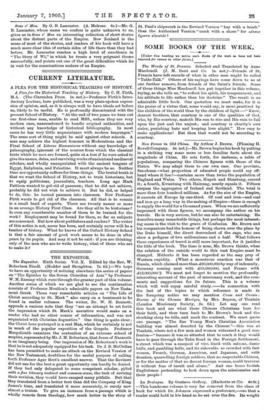New Forces in Old China. By Arthur J. Brown. (Fleming
H. Revell Company. 6s. net.)—Mr. Brown begins his book by putting in a striking way some more or less familiar facts about the magnitude of China. He sets forth, for instance, a table of populations, comparing the Chinese figures with those of the States. We may adapt them to our own case. One province, Sze-chuen—what proportion of educated people could say off- hand where it lies ?—contains more than twice the population of England and Wales. Two others, Hupeh and Shantung, exceed it; a fourth, Kwantung with Hainung, nearly equals it. Fifteen surpass the aggregates of Ireland and Scotland. The total is more than four hundred millions. As for the size of the Empire, it exceeds all Europe by one-third. Of coal and iron—and coal and iron go a long way in the making of Empire—there is enough to supply the world for a thousand years. When we are sufficiently impressed with these figures, we accompany the author on his travels. He is very serious, but he can also be entertaining. He describes many remarkable things, but perhaps the most interest- ing scene is the visit to the grave of Confucius. Mr. Brown and his companions had the honour of being shown over the place by the Duke himself, the direct descendant of the sage, who can show a pedigree of two millenniums and a half. What follow& these experiences of travel is still more important, for it justifies the title of the book. The time is near, Mr. Brown thinks, when the relation of the outside world to this vast Empire must be changed. Hitherto it has been regarded as the easy prey of Western cupidity. (What a monstrous exaction was that of Russia, which claimed more than £20,000,000 by way of indemnity, Germany coming next with £15,000,000, and France with £12,000,000!) We must not forget to mention the profoundly interesting account of the past of missionary work, and the com- ments and suggestions for its future. This is a volume which will well repay careful study.—In connection with the last of the topics to which reference is made in the foregoing notice we may mention Cross and Crown; Stories of the Chinese Martyrs, by Mrs. Bryson, of Tientsin (London Missionary Society, 2s. 6d.) Let any one read this book and see what these Chinese Christians bore for their faith, and then turn back to Mr. Brown's book and the shocking story he tells, and mark the contrast. We must quote one passage. "The fine Young Men's Christian Association building was almost deserted by the Chinese "—this was at Tientsin, where not a few men and women witnessed a good con- fession—" because it was so situated that to reach it they would have to pass through the Taku Road in the Foreign Settlement, a street which was a cesspool of vice, lined with saloons, dance halls, and gambling hells, and its sidewalks so crowded with fast women, French, German, American, and Japanese, and with drunken, quarrelling foreign soldiers, that no respectable Chinese, or for the matter of that no decent foreign woman, could traverse it without fear of insult and abuse." And one hears foolish. Englishmen pretending to look down upon the missionaries and their people !














































 Previous page
Previous page